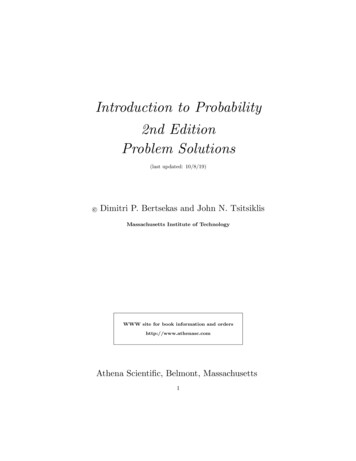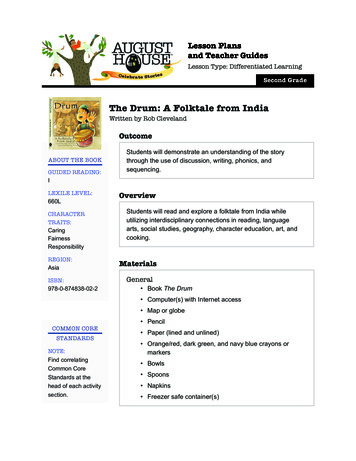
Transcription
Daily Vocab Capsulend2 May 2019
An Employment-Oriented Economic PolicyIn the heated debate on jobs, the crucial link between macroeconomic policy and unemployment has not beenflagged.Innumerable tasks with respect to the economy await the winner of the parliamentary elections now under way,but two may be mentioned and they are connected. The first is to review the conduct of macroeconomic policy.Though it must come across as arcane, this is an element of public policy that makes a difference to whether weenjoy economic security or not. This brings up the second task for the winner, namely employment generation.The macroeconomic policy pursued in the past five years needs overhauling. The government has continued withfiscal consolidation, or shrinking the deficit, while mandating the Reserve Bank of India (RBI) to exclusivelytarget inflation leaving aside all other considerations. This has contracted demand. That high fiscal deficits andhigh inflation per se can never be good for an economy does not justify a permanently tight macroeconomicstance. The rationale given for one is that it is conducive to private investment, said to be shy of fiscal deficitsand held back by inflation. Both the deficit and inflation have trended downward in the past five years, yetinvestment as a share of national income has remained frozen.Inflation targetingNow, while fiscal consolidation was something the Narendra Modi government had inherited, it has taken creditfor having moved India onto the path of ‘inflation targeting’. Arguably though, India has seen a virtual inflationtargeting since 2013 when the policies of the RBI became more closely aligned to the practices of central banksin western economies. Thus in 2013-14 the real policy rate saw a positive swing of over four percentage points,and it has more or less remained there. Admittedly, at double digits, inflation had been high in 2012-13 but thatcould have been due to abnormal hikes in the procurement price and not due to runaway growth. However, asthe theory underlying inflation targeting asserts that it reflects an over-heating economy, an interest-rate hike istriggered. The high interest rate regime in place since 2013 could not but have had a negative impact on growthby raising the cost of capital to industry. The negative impact of a high policy rate may, however, have appearedelsewhere too.Reviewing RBI’s roleA regime of high interest rates can be bad not only for investment — and thus for growth and employment — butalso for financial stability. Sharp increases in interest rates can trigger distress. A trade-off between low inflationand financial stability could emerge depending upon how the former was purchased. If low inflation is achievedvia high interest rates it can trigger financial instability in two ways. The first is via the direct impact on the costof financing in a floating interest-rate regime; a higher policy rate translating into a higher borrowing rate. Second,if rising interest lowers growth, revenue will grow more slowly for firms. Both these mechanisms can renderonce-sound projects unprofitable, leaving banks stressed. It appears that this did not find a place in the operating
manual that goes with the ‘modern monetary policy framework’, with inflation targeting as its primary focus,instituted in India in 2015. That our concerns are not purely imaginary is evident in the fact that there has been agrowth of non-performing assets of banks even after a change in the method of classification first resulted in theirsurging in 2015. This feature along with the spectacular collapse of the giant Infrastructure Leasing and FinancialServices Ltd (IL&FS) recently point to the need to review the role of the RBI.Experience suggests that it must be tasked with far greater responsibility for maintaining financial stability whilebeing granted wider powers. It goes without saying that the Finance Ministry and its nominees on the RBI Boardshould desist from insisting upon actions that could jeopardise financial stability in trying to quicken theeconomy. At the same time, the RBI’s leadership may want to reflect on the mindset that leads to publiclylecturing the government of India on the fate of incurring the “wrath of financial markets”. Whatever be thecompulsions of securing the balance of payments, such a view privileges the interests of international financecapital over the public interest in a democracy. It also suggests that the movements in the financial markets are tobe treated as the bellwether in economic policy-making. Actually, over the past 30 years, from Mexico tosoutheast Asia, financial markets can be seen to have been fickle, self-serving and capable of causing great harmas they switch base globally in search of profits through speculation.The entire gamut of macroeconomic policy in India needs re-thinking. In the heated public debate on job creationthat we have seen recently, the link between macroeconomic policy and unemployment has not been flagged.When policy holds back investment, and we have seen above that it can, the prospect for employment growth isweak. The conduct of macroeconomic policy in India in recent years has compromised the principle that its twoarms of fiscal and monetary policy must be used in a countervailing matter if aggregate demand is not to beaffected. Instead, for too long, macroeconomic policy in India has been contractionary across the board, impactingemployment adversely.Job creationEven as we shift towards macroeconomic policies that maintain the level of aggregate demand, we can assist theunemployed by strengthening the employment programme we already have, namely the Mahatma GandhiNational Rural Employment Guarantee Scheme (MGNREGS). Three actions may be taken towards this end. First,there have been reports that though the budgetary allocation for the scheme may have increased, workers facedelay in payment. This is unacceptable, especially in this digital era when beneficiary identification and moneytransfer are cheap and reliable. Second, as has been suggested, there is a case for extending the MGNREGS tourban India for there is unemployment there. Of course, some rationalisation of existing public expenditure wouldbe needed to generate the fiscal space needed, but we may yet expect a positive sum outcome when this is doneimaginatively.However, as with macroeconomic policies, a thorough review of how the MGNREGS works on the ground isnecessary. In the context, we often find a reference to “asset creation”. This is an important criterion but we neednot rule out the provision of public services under the scheme. The point is to ensure that we have desirableoutcomes beyond just the job statistics. There is reason to believe that this matter is given no importance in theimplementation of the scheme at present. An example would make this clear.In Kerala, employment under the MGNREGS is also organised to clear the vegetation at the roadside. However,what at times is found to remain after the MGNREGS work team has left is the garbage that was earlier concealedby the undergrowth. The organised ‘cleaning’ expertly skirts the garbage unconscionably deposited at theroadside! This is more than just a matter of aesthetics and can be dangerous when, for instance, waste fromabattoirs has been dumped in the shrubbery. It makes a mockery of publicly-funded programmes that they canleave us worse off, and speaks of the unaccountability that pervades so much of government intervention in theeconomy. But recognising the hazard opens up an opportunity for improvement. The MGNREGS should targetthe waste dotting our countryside, and when extended to urban India should aid municipal waste-management
efforts. We would then have a cleaner environment and have at the same time created jobs. That would a fittingtribute to the man after whom the programme is named, one who had worked for a clean India much of his life.Courtesy: The Hindu (National)1. Arcane (Adjective): Meaning: understood by few; mysterious or secret. (रहस्य का)Synonyms: Esoteric, Recondite, Cryptic, Delphic, ObscureAntonyms: Exoteric, Familiar, ShallowExample: This argument may seem arcane to those not closely involved in the world of finance.2. Evident (Adjective): Meaning: plain or obvious; clearly seen or understood. (प्रत्यक्ष)Synonyms: Apparent, Conspicuous, Perceptible, Discernible, Palpable, UndoubtedAntonyms: Unnoticeable, Obscure, Vague, DubiousExample: His footprints were clearly evident in the heavy dust.3. Distress (Noun): Meaning: extreme anxiety, sorrow, or pain. (पीडा, विपवि)Synonyms: Anguish, Torment, Agony, Misery, Woe, GriefAntonyms: Happiness, Comfort, Jollity, Jubilation, RaptureExample: Nothing could alleviate his distress.4. Desist (Verb): Meaning: stop doing something; cease or abstain. (रोकना, परहे ज करना)Synonyms: Abstain, Refrain, Eschew, Shun, Forgo, HaltAntonyms: Indulge, Yield To, Embrace, Pursue, Persist InExample: Please desist from smoking in this area.
5. Jeopardize (Verb): Meaning: put (someone or something) into a situation in which there is a danger of loss,harm, or failure. (ख़तरे में डालना)Synonyms: Imperil, Endanger, Hazard, MenaceAntonyms: Guard, Shelter, Shield, PreserveExample: His foolish behaviour may jeopardize his whole future.6. Wrath (Noun): Meaning: extreme anger. (रोष, कोप)Synonyms: Rage, Fury, Indignation, Outrage, Chagrin, Exasperation, CholerAntonyms: Calmness, Mildness, Delight, SerenityExample: God's wrath will be visited on sinners.7. Fickle (Adjective): Meaning: changing frequently, especially as regards one's loyalties, interests, or affection.(अस्थिर, चपल)Synonyms: Capricious, Mercurial, Vacillating, Fitful, Irresolute, Giddy, SkittishAntonyms: Steadfast, Unvarying, Unwavering, StaunchExample: Fortune is fickle.
8. Gamut (Noun): Meaning: the complete range or scope of something. (विस्तार, पररवि)Synonyms: Spectrum, Span, Sweep, Compass, Extent, Catalogue, VarietyAntonyms: Part, Section, PortionExample: This poem runs the gamut of emotions from despair to joy.9. Countervail (Verb): Meaning: offset the effect of (something) by countering it with something of equalforce. (बराबर प्रभाि के साि प्रविकार करना)Synonyms: Offset, Balance Out, Counteract, Counterpoise, Neutralize, NullifyAntonyms: Approve, Encourage, ValidateExample: His skills countervail his opponent's superior strength.10. Pervade (Verb): Meaning: (especially of a smell) spread through and be perceived in every part of; bepresent and apparent throughout. (सब जगह फैल जाना, व्याप्त होना)Synonyms: Permeate, Suffuse, Perfuse, Infuse, ImpregnateAntonyms: Drain, Deplete, VacateExample: A feeling of great sadness pervades the film.
Antonyms: Exoteric, Familiar, Shallow Example: This argument may seem arcane to those not closely involved in the world of finance. 2. Evident (Adjective): Meaning: plain or obvious; clearly seen or understood. (प्रत्यक्ष) Synonyms: Apparent, Conspicuous,

